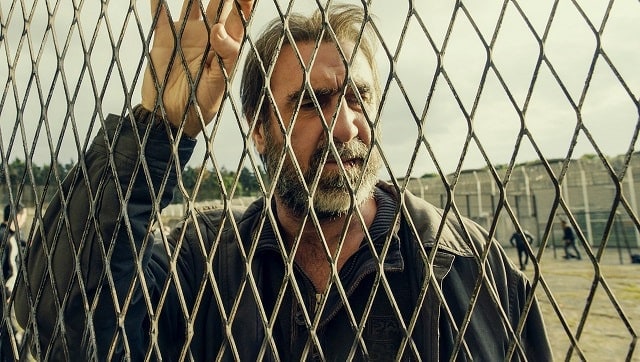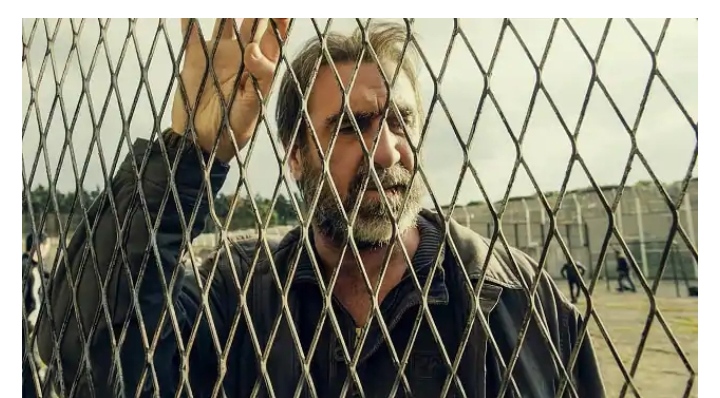Why inhuman resources Netflix’s Eric Cantona starring thriller makes for cathartic viewing during global crisis
Twenty-five years ago, during a club football game, the French soccer star Eric Cantona unleashed what came to be known as the infamous flying “kung-fu kick”, on the racist football hooligan Matthew Simmons, after being taunted by the Englishman on his foreign origins.
Cantona was known for his dominant on-field presence, opportunistic goal-scoring ability and his mercurial personality both on and off the football field. “If I’d met that guy on another day, things may have happened very differently even if he had said the same things. Life is weird like that,” Cantona had remarked later during an interview, provocatively describing this assault on the fan as one of the “happiest moments” of his life.
The aftermath of this event nearly ended Cantona’s fabulous stint of 80 goals and four league victories for Manchester United. His future with the French national team was also threatened because of the incident. After his international career was over, Cantona reinvented himself as an actor and a filmmaker, working in theatre, collaborating with filmmakers such as Shekhar Kapoor and Ken Loach, while independently directing several documentaries.
The mercurial persona of Cantona has been reinvented recently, albeit in a fictional narrative, in a new miniseries called Inhuman Resources (original title Dérapages) launched by Netflix on 15 May 2020. Cantona plays a middle-aged HR manager called Alan Delambre; after losing his job, Delambre is forced into underpaid wage-labour in the course of which he faces daily harassment.

Eric Cantona in Netflix’s Inhuman Resources
Amidst the everyday indignities and the threat of losing his apartment, Delambre experiences depression, anxiety, and relationship problems. So, when offered a new HR job by a big corporate, he is desperate to grab the job at any cost. However, he is shocked to learn that the intentions of his employers are sinister and far from honourable. Realising that he is being used to launch a fake hostage drama by the company to flush out potential traitors among its ranks, Delambre takes matters into his own hands, triggering a dramatic showdown.
In terms of plot and narrative, Inhuman Resources has a strong resemblance to French director Costa-Gavras’ Hollywood film Mad City (1997) featuring John Travolta and Dustin Hoffman in the main roles. The five-hour long series combines elements of various other ‘hostage dramas’ such as John Q (2002) and Money Monster (2016) in which the hostage-takers are portrayed not as villains, but almost as desperate crusaders.
Apart from Cantona’s angry past, Inhuman Resources successfully manages to plug into the prevailing anti-establishment sentiments in France over the past few years as seen in the gilets jaunes (yellow vests movement) and other working-class protests. Alan Delambre in Inhuman Resources is a product of this agitational milieu.
Incidentally, another successful Netflix series, Money Heist (2020), is an attempt to represent a violent robbery as a story of a revolt of the Spanish underclass against an unjust economic system. In its attempt to give a violent action narrative an anti-capitalist spin, Money Heist exploits Italian protest song ‘Bella Ciao’ as a musical motif.
Inhuman Resources avoids the shortcuts used by the creators of Money Heist. Alan Delambre bristles with the rage and indignation of an honest person who has been persistently wronged by an unfeeling socio-economic system. For those interested in psychology, Delambre’s character is a textbook study of masculinity — an example of male aggression, violence and despondency under extreme pressure — and they can even dig into Cantona’s personal history.
There are other notable performers in the series: Suzanne Clement playing the protagonist’s wife Nicole, and Alice De Lenquesaing as his daughter Lucie, give powerful supporting performances. Among the various characters of the series, Nicole’s character is the most rounded. Married to an honest, hardworking, but a volatile man, Nicole portrays a combination of bewilderment and anger at her husband’s self-destructive streak and grapples with the physical and emotional consequences of his outbursts. Clement manages to deftly capture the emotional complexity and the relational dynamics of the middle-aged couple, compensating for Cantona’s raging, masculine presence, with her quiet, feminine strength.
In a way, the Delambre family’s predicament resonates with what is happening to families across the world during the COVID-19 pandemic. Social inequities have widened, amid loss of lives and livelihoods. Loss of jobs, huge cuts in salaries and wages, defaults in rents or mortgage payments have become part of the lived reality of millions across the world. Accompanying it are various kinds of stresses and strains on familial dynamics, as well as anger towards multinational corporations and their relationship with regimes across the world.
It is ironic and somewhat coincidental that Inhuman Resources was released against this backdrop, and to satisfy the demand of captive audiences binge-watching OTT content. Amidst this despondency, audiences will undoubtedly seek catharsis in Alan Delambre’s painful predicament and as well as in his effort to improve his life in the face of tumultuous developments.
Dr Indranil Bhattacharya is professor — Screen Studies and Research at FTII




